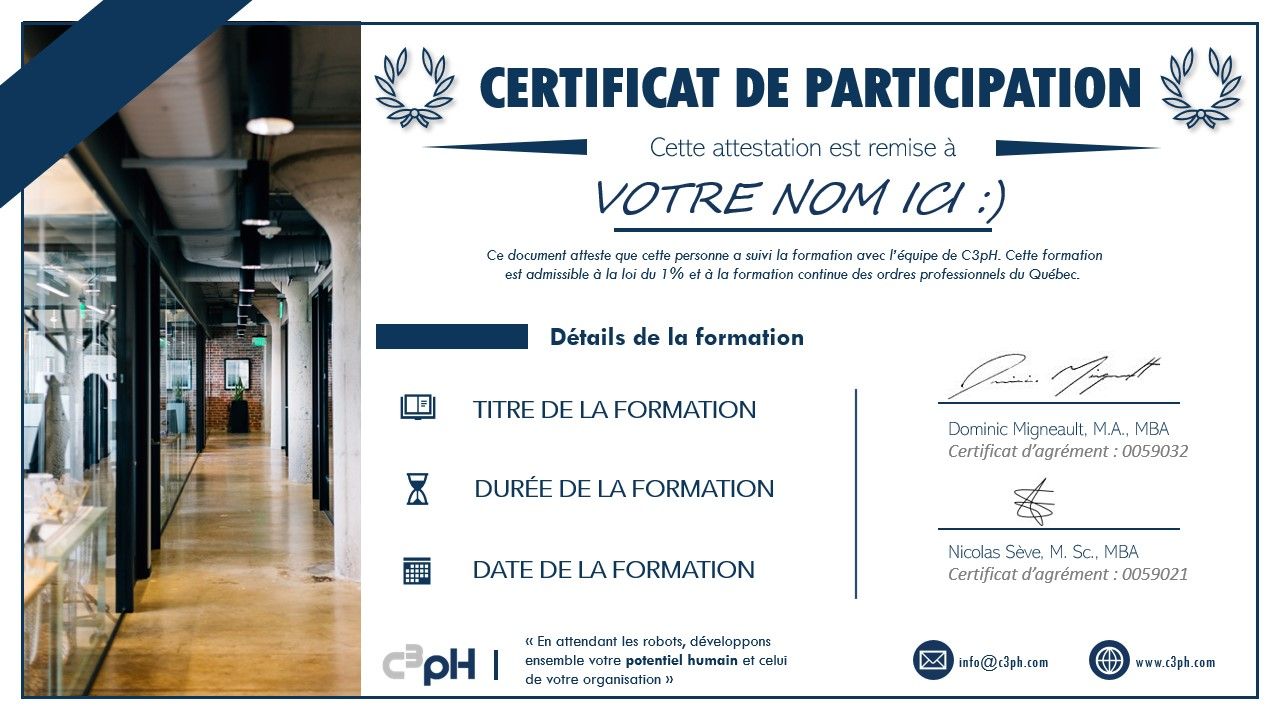Training: Managing difficult people at work
Course description
They're already training with us!
Troubled employee vs. difficult employee
How can you tell the difference between difficult and troubled employees? The distinction is important, because as a manager, employee or supervisor, you won't approach problems in the same way. In this training course, we'll tell you how to distinguish between difficult and troubled employees.
Causes of a difficult situation
Many events can trigger a change in the behavior of colleagues or employees, who will then adopt difficult behavior. Sometimes, these difficult colleagues or employees will be so from the very first days of their arrival in your organization. During this training course, we will list and detail the causes of a difficult situation, so that you can prevent attitudes which could damage your organization, and act quickly to manage your difficult colleagues or employees.
Problem solving
Managing difficult employees must be approached in such a way as to protect your organization and other employees from negative behavior, while at the same time supporting the difficult person. As a manager, you'll need to act methodically to resolve conflicts and bring about changes in attitudes. During this training, we'll help you develop an action plan to manage your difficult colleagues or employees.
Building an improvement plan
To help your difficult colleagues or employees change their behavior, we will help you, during this training, to draw up an improvement plan for these difficult people. We'll give you ideas for corrective action, as well as tips for monitoring the progress of your difficult colleagues or employees.
Non-violent communication
It's through exchange and discussion that you'll succeed in convincing your difficult employees of their behavioral problems. This important but difficult stage must be well prepared and conducted in a direct but courteous manner, with objective and tangible information on your employees' problematic behavior. During this training course, we'll give you the keys to establishing a constructive dialogue with your difficult colleagues or employees.
The art of questioning
To recognize and manage your difficult colleagues or employees, you'll need to ask yourself a whole series of questions to gain precise information about their behavior. The aim will be to understand the problems of your difficult employees and to pinpoint their origins, in order to develop a strategy aimed at changing their behavior. During this training course, we'll give you the most relevant questions to ask yourself to successfully identify your difficult colleagues or employees, gain a good understanding of their problems and then correct problem behaviors.
During the course, we'll define and give concrete examples to help you fully understand each of the 6 dimensions of the Engagement Radar. These 6 dimensions are trust, belonging, professional development, recognition, meaning and comfort.
Between 2 and 3 innovative management practices will be presented for each of the six dimensions of the engagement radar. In other words, some twenty concrete practices will be presented to see what the best organizations are doing in terms of engagement and retention. These practices come from five continents and different types of organization.
For many employees, managers and executives, the agenda is at the heart of professional life. During this training course, we'll be giving you practical tips and best practices for better organizing your agenda and optimizing your time management.
This course is designed for :
How do our training courses work?

-
Certificate at the end of the course
-
Between 8 and 25 participants - quotation possible for more or fewer participants
-
Duration: 1 h, 2 h, 3 h or 6 h - two 3-hour sessions possible
-
Workshop - Building an improvement plan
-
Role play - Meeting the difficult employee
-
Live quiz on the Wooclap platform
Not sure what to do? We'll answer your questions!
How to register for our training courses
To register your team or organization for our training courses, you can choose :
See you soon!
- Contact us using the form at the end of this page, and we'll get back to you as soon as possible.
- Book a visio meeting directly in our electronic diary according to your availability.
- We can also be reached by e-mail: info@c3ph.com or by telephone: 514-714-2538
See you soon!
How many people from my organization can I enroll in your training courses?
Our training courses are run in groups. You can register between 8 and 25 people.
For fewer than 8 or more than 25 participants, please contact us directly for a personalized quote.
For fewer than 8 or more than 25 participants, please contact us directly for a personalized quote.
Do I get certification after the course?
Yes !
Our training courses are designed in their entirety by two HEC Montréal professors and trainers at the École des dirigeants HEC.
Thanks to our training certificates, your training investments with C3pH are eligible for the 1% law, since our trainers are accredited by the Commission des partenaires du marché du travail (CPMT).
Our training courses are also eligible for the continuing education hours of Quebec's professional orders.
Do you offer customized training courses?
Yes, this is one of our areas of expertise. If you want to develop the skills of your employees, managers or, more specifically, a department or team, you've come to the right place with C3pH.
We have a design service for customized training courses so that it meets specifically to your training project.
We have a design service for customized training courses so that it meets specifically to your training project.
In addition, we offer individual coaching sessions to tailor each participant's learning experience to his or her specific situation.
What is blended learning and do you offer this type of training service?
Blended learning is a hybrid approach to learning that enables our participants to enjoy a unique training experience with :
We recommend this blended training methodology, which focuses on the impact of learning and the suitability of formats for teaching purposes without imposing any particular learning style.
- Modules on our e-learning platform to give them the flexibility to learn when and where they want
- Live modules (online or face-to-face) to give them the chance to exchange ideas with each other and with our trainers, to make the most of collective intelligence.
We recommend this blended training methodology, which focuses on the impact of learning and the suitability of formats for teaching purposes without imposing any particular learning style.
In what currencies can I pay for training courses?
You can pay in the currency of your country. Euro, US Dollar, Canadian Dollar, etc.
Our website displays prices in Canadian dollars, as our training studio is located in Quebec.
If you pay in a currency other than the Canadian Dollar, the payment will simply be converted into the currency of your country.
My organization is in France, Belgium, Switzerland or North Africa. Can I register for your training courses?
Yes, we work with companies outside Canada and use innovative management practices that have been proven internationally.
May I contact you if I have a question?
We'd love to! You can get in touch with us on LinkedIn, on Facebook or by sending us a message on our contact page.








